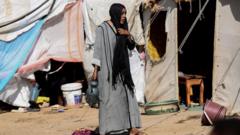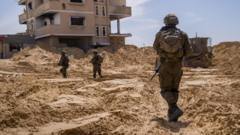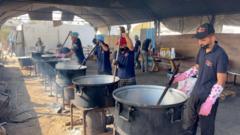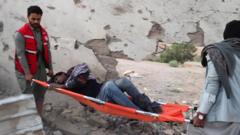A new chapter in Sudan's turbulent civil war saw the first drone attack on Port Sudan by the paramilitary Rapid Support Forces, raising fears of further instability in a city previously deemed safe. The conflict, which has already caused widespread humanitarian crises, now threatens to pull in even more civilians as both sides become entrenched in their positions.
Sudan's Civil War Escalates: Paramilitaries Launch First Attack on Port Sudan

Sudan's Civil War Escalates: Paramilitaries Launch First Attack on Port Sudan
The Rapid Support Forces launched drone strikes on Port Sudan's military airport, marking a significant escalation in Sudan's ongoing civil conflict.
Hundreds of thousands of civilians have sought refuge in Port Sudan as the brutal civil war in Sudan escalates. On Sunday, the paramilitary group Rapid Support Forces (RSF) executed a drone attack on the city's military airport, Osman Digna Air Base, signaling the first time the RSF has targeted the city since the conflict erupted two years ago. According to Sudanese army spokesperson Nabil Abdullah, the attack involved multiple "suicide drones" directed at military and civilian facilities, though no injuries were reported; only "limited damage" occurred.
Since the conflict ignited in April 2023 due to a fierce power struggle between the Sudanese Armed Forces (SAF) and the RSF, the situation has deteriorated drastically, resulting in at least 150,000 deaths and displacing around 12 million people. The United Nations continues to characterize Sudan's crisis as the largest humanitarian disaster globally, with over 30 million people requiring assistance amid severe food shortages and looming famine.
Until Sunday, Port Sudan had largely escaped the violence engulfing the nation and was considered a safe haven for those fleeing the conflict. After the SAF lost control of Khartoum, Port Sudan became the de facto center of governance for the military-led authorities under General Abdel Fattah-al Burhan. UN agencies relocated their operations there, providing a semblance of stability amidst chaos.
Eyewitness accounts describe hasty evacuations from the airport following the drone strikes. Reports of explosions and thick black smoke have emerged on social media, although they have not been independently verified. Following the attack, the airport was closed, and flight operations were suspended.
This recent escalation represents a growing trend of RSF drone assaults targeting military assets in areas controlled by the army. For instance, an earlier drone strike on Kassala, located about 400 kilometers from RSF-controlled regions, underscores a widening battlefront.
While the SAF has reclaimed significant territories, including Khartoum's presidential palace, expectations for either faction to secure a unifying victory seem bleak. The International Crisis Group suggests that neither side can govern all of Sudan effectively. The civil war, which has now entered its third iteration in 70 years, exacerbates the divisions within the country.
The conflict's roots trace back to a 2021 coup that positioned a military council, led by Burhan and RSF chief Mohamed Hamdan Dagalo (Hemedti), at the helm of Sudan. Divergent views regarding the transition to civilian rule and the integration of RSF forces into the army led to soaring tensions, ultimately igniting armed conflict.
International attempts to facilitate negotiations have repeatedly faltered, compounded by extensive foreign military support fueling both factions. With the escalating violence, the pressing question remains how Sudan can mend its fractured landscape and what implications lie ahead for civilians caught in the crossfire.





















